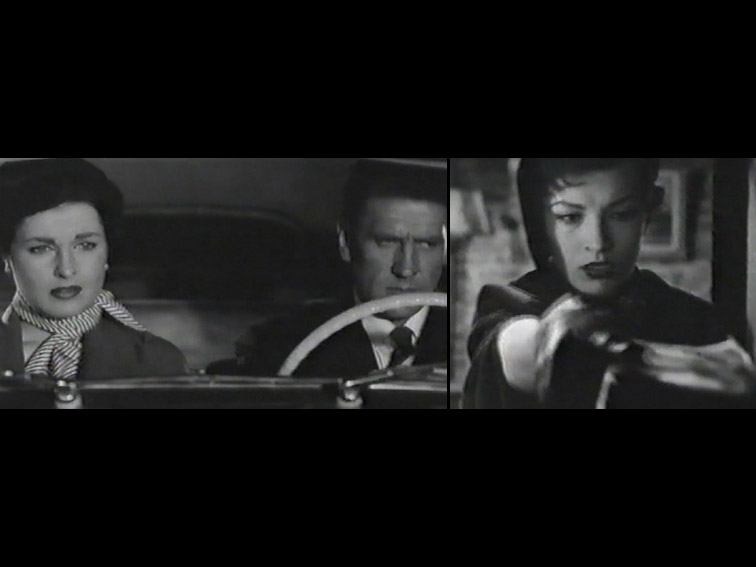 Red Road is a much heralded 2006 British thriller – or thriller of a kind – directed by Andrea Arnold, who won an Oscar for her short film Wasp back in 2003. The story follows Jackie (Kate Dickie), who has a job as a CCTV camera operative, spending her working hours observing the minutae of life in the run-down, titular Glasgow council estate. Her personal life doesn’t offer much cheer either, as she’s still suffering from the grief of losing her husband and child in a road accident some years earlier.
Red Road is a much heralded 2006 British thriller – or thriller of a kind – directed by Andrea Arnold, who won an Oscar for her short film Wasp back in 2003. The story follows Jackie (Kate Dickie), who has a job as a CCTV camera operative, spending her working hours observing the minutae of life in the run-down, titular Glasgow council estate. Her personal life doesn’t offer much cheer either, as she’s still suffering from the grief of losing her husband and child in a road accident some years earlier.
This rather desperate stasis all changes when she discovers that the person who had been driving the car that killed her famiy, former crack-addict Clyde (Tony Curran), has been released from prison. She begins watching him through the numerous CCTV cameras, building up an impression of his life which is far from favourable (it seems mainly to revovle around shagging and drinking). Eventually she comes up with a plan; after engineering a meeting with him, she sets about seducing him and then falsely accusing him of rape. However, while doing this she comes to discover that there’s a bit more about him than being some kind of characterless villain, and also to reassess her own, joyless life.
This is a good film, beautifully shot, nicely acted and well directed. It’s less glum than it sounds as well; ending on a vaguely upbeat note and allowing most of the characters to acheive some kind of redemption. The one problem I would note is that, at 113 minutes, it’s probably a good quarter hour too long. The first half, in particular, has a cetain soporithic quality, not exactly helped by the amount of time that’s spent watching Jackie watching TV monitors. Still, that’s a minor quibble, and otherwise it’s highly recommended.
However, I do think that the amount of plaudits showered on Red Road may be somewhat excessive, and I think it serves a useful exercise to compare it to an extremely similar film which was released the previous year, Juliet McKoen’s Frozen. Frozen was again directed by a first-time female director, revolved around a grief-struck woman (Shirley Henderson in McKoen’s film) and featured CCTV as an integral component. Both films are also very good; from a technical perspective they’re admirable, and they both benefit from clever, interesting scripts. And yet, while Red Road picked up awards left, right and centre, Frozen was virtually ignored, especially within the UK.
So why was this? Well, maybe Frozen was ahead of it’s time, coming before the increase in concern about CCTV Britain. But then again, CCTV has been featuring repeatedly in UK films since the turn of the century (My Little Eye, in 2002, being an early example). Rather, I think there are two reasons, both of which involve the blinkered perspective of the domestic critical establishment.
Firstly, whereas Red Road is a slow burning psychological drama, Frozen is a slow burning ghost story / murder mystery. British critics, despite their inclusive proclamations, still tend to rate anything that’s of a genre as being somehow less worthy, especially if it’s homegrown. This is an almost perfect example of how two films with hardly a whisper between them are judged differently because of the type of film they are.
Secondly, whereas Frozen has a fantastical aspect, Red Road is relentlessly realistic. And, for broadsheet critics, realism is King. I don’t know if this is something that’s innate to British criticism, or if it’s because a lot of the more reputable critics around at the moment grew up with the ‘realism’ of the Angry Young Men. My problem with this is that none of these films are particularly relaistic; both Red Road and London to Brighton (a similarly good film that was perhaps overhyped) attempt to portray a ‘realistic’ milieu that’s almost entirely unrealistic. But, because they involve the underclass and accentuate the glum, they’re seen as being more authentic. London to Brighton, for instance, revolves around a prostitute who has a heart of gold and isn’t a drug addict (in other words, just a step above Pretty Woman in realism terms). Red Road similarly features some quite absurd contrivances. Which isn’t a problem, unless you start punishing films for trying to break down the barriers of realism and go beyond the well-mined territory of Mike Leigh and Ken Loach.

